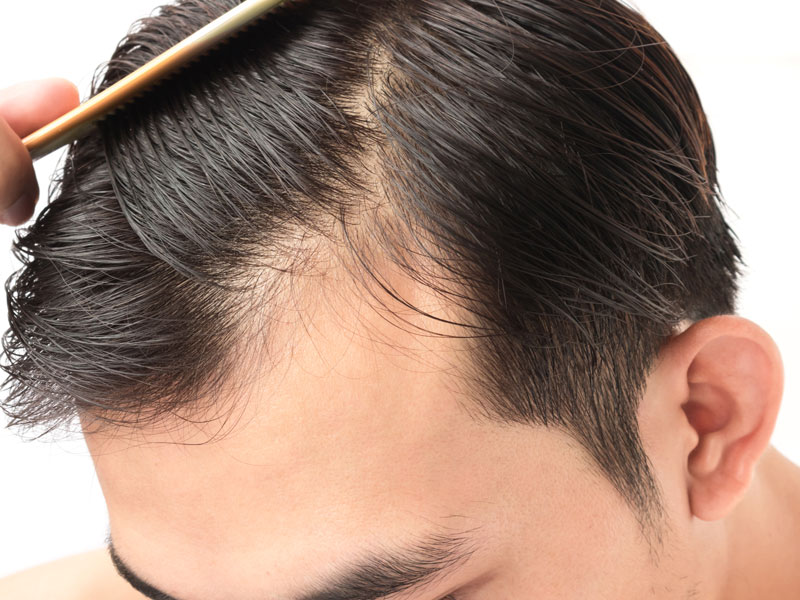Radiotherapy makes the hair fall out in the area being treated. Radiation therapy also attacks quickly growing cells in your body, but unlike chemotherapy, it affects only the specific area where treatment is concentrated.
Does Body Hair Fall Out With Chemo, Sometimes your eyelash, eyebrow, armpit, pubic and other body hair also falls out. This same disruption interferes with your hair follicles� ability to produce new hair cells.

The majority of hair loss from chemotherapy is temporary. The greatest difference between cancer cells and normal ones is their proclivity for indefinite replication. Some treatments cause only partial hair loss or thinning, while others cause people to lose hair from all over their body. It was always gone by the second chemo.
Chemotherapy may cause hair loss all over your body — not just on your scalp.
Chemotherapy may cause hair loss all over. It was always gone by the second chemo. But just remember your hair will grow back again. You’ll likely notice accumulations of loose hair on your pillow, in your hairbrush or comb, or in your sink or shower drain. Facial hair, arm and leg hair, underarm hair, and pubic hair all may be affected. Talk to your doctor about what you can expect.
 Source: pinterest.com
Source: pinterest.com
The hairs on the scalp fall out first, and then a little later facial hair, body hair and pubic hair may fall out too. The majority of hair loss from chemotherapy is temporary. Hair usually begins falling out two to four weeks after you start treatment. This can include eyebrows, eyelashes, nose hair, beards, moustaches, chest hair, and leg, arm,.
 Source: althian.com
Source: althian.com
Chemotherapy may cause hair loss all over. Losing your hair to chemo? The greatest difference between cancer cells and normal ones is their proclivity for indefinite replication. When you have chemo, the drugs attack rapidly growing cancer cells. Hair loss typically starts one to three weeks after chemotherapy is started.
 Source: healthline.com
Source: healthline.com
Good luck with your adjustment. Facial hair, arm and leg hair, underarm hair, and pubic hair all may be affected. As the chemicals begin to affect the body, the hair begins to fall out. The doctor tells you that you’re going to lose your hair. You may lose all or some of your hair.
 Source: youtube.com
Source: youtube.com
Some chemo treatments do not make people’s hair fall out but it does become thinner or duller. It all depends on the type of drug and individual sensitivity. This is almost always temporary. Losing your hair to chemo? How long will your hair grow back?
 Source: rethinkbreastcancer.com
Source: rethinkbreastcancer.com
Some chemotherapy drugs are more likely than others to cause hair loss, and different doses can cause anything from a mere thinning to complete baldness. Hair on other parts of the body is not usually affected. It all depends on the type of drug and individual sensitivity. The hairs on the scalp fall out first, and then a little later.
 Source: torontohairtransplantclinic.com
Source: torontohairtransplantclinic.com
The majority of hair loss from chemotherapy is temporary. It could fall out very quickly in clumps or gradually. Some chemo treatments do not make people’s hair fall out but it does become thinner or duller. Hair loss from cancer treatment can affect people in different ways. Good luck with your adjustment.
 Source: pinterest.com
Source: pinterest.com
Radiotherapy makes the hair fall out in the area being treated. Whether or not your hair remains as it is, thins or falls out, depends on the drugs and dosages. Some treatments cause only partial hair loss or thinning, while others cause people to lose hair from all over their body. Losing your hair to chemo? When you�re in chemotherapy,.
 Source: pinterest.com
Source: pinterest.com
Hair loss may occur as early as the second or third week after the first cycle of chemotherapy, although it may not happen until after the second cycle of chemotherapy. This varies person to person. Some chemo treatments do not make people’s hair fall out but it does become thinner or duller. The greatest difference between cancer cells and normal.
 Source: pinterest.com
Source: pinterest.com
Facial hair, arm and leg hair, underarm hair, and pubic hair all may be affected. Hair loss from cancer treatment can affect people in different ways. Take it a day a time, and cry if you need to. Is it an easy road? After chemo stops and your follicles are healthy, your hair should start to grow back.
 Source: youtube.com
Source: youtube.com
Hair loss will usually begin gradually within two or three weeks of starting chemotherapy. The result is a sensitive scalp and, often, hair that falls out close to the root. The level and occurrence of hair loss, or cia, hinges on several variables, including the type of cancer you have, the specific medications utilized and the dosing or schedule of.
 Source: youtube.com
Source: youtube.com
Hair loss on the treated body area is another side effect of radiation therapy. When you have chemo, the drugs attack rapidly growing cancer cells. Hair loss from cancer treatment can affect people in different ways. Not all chemotherapy medicines cause hair loss. Often people may find they start losing their hair in.
 Source: pinterest.de
Source: pinterest.de
This can include eyebrows, eyelashes, nose hair, beards, moustaches, chest hair, and leg, arm, underarm and pubic hair. Radiotherapy makes the hair fall out in the area being treated. Now, it might surprise you to learn that not all chemo drugs cause hair loss. It’s quite common to have hair loss or thinning with some chemotherapy drugs. Hair loss will.
 Source: trichology.com
Source: trichology.com
It was always gone by the second chemo. But you’ll have an opportunity to try just about every hairstyle imaginable, so you might as well embrace it and make the best of each stage. When you have chemo, the drugs attack rapidly growing cancer cells. Cancer cells have a high mitotic rate (the speed by which the cells multiply and.
 Source: youtube.com
Source: youtube.com
Some treatments cause only partial hair loss or thinning, while others cause people to lose hair from all over their body. Radiotherapy makes the hair fall out in the area being treated. Hair loss from cancer treatment can affect people in different ways. Radiation therapy also attacks quickly growing cells in your body, but unlike chemotherapy, it affects only the.
 Source: pinterest.com
Source: pinterest.com
Alopecia is the medical term for hair loss. Chemo can damage cells in the hair follicles, hair growth can slow, and hair falls out. Hair loss may occur as early as the second or third week after the first cycle of chemotherapy, although it may not happen until after the second cycle of chemotherapy. Whether or not your hair remains.
 Source: medicalnewstoday.com
Source: medicalnewstoday.com
Chemo can damage cells in the hair follicles, hair growth can slow, and hair falls out. As the can’t distinguish different types of growing cells, they also attack other rapidly growing cells in your body such as. After chemo stops and your follicles are healthy, your hair should start to grow back. Hair loss from chemotherapy chemotherapy can cause hair.
 Source: hairlossexperiences.com
Chemotherapy may cause hair loss all over your body — not just on your scalp. If you have radiation to your head, you’ll likely lose. Hair loss on the treated body area is another side effect of radiation therapy. So, let’s take it from the top. It’s not exactly how it works, but in general it’s true.
 Source: pinterest.com
Source: pinterest.com
Your doctor is the best person to inform you about how much hair loss you can expect. When you�re in chemotherapy, chemicals are introduced to your body to disrupt cancer cells, so that they can�t multiply. As the can’t distinguish different types of growing cells, they also attack other rapidly growing cells in your body such as. Does pubic hair.
 Source: fuehairtransplantpakistan.com
Source: fuehairtransplantpakistan.com
Hair loss may occur as early as the second or third week after the first cycle of chemotherapy, although it may not happen until after the second cycle of chemotherapy. How long will your hair grow back? Losing your hair to chemo? Hair loss background when does hair fall out after chemo and how long does it take to grow.
 Source: pinterest.com
Source: pinterest.com
Hair loss typically starts one to three weeks after chemotherapy is started. The greatest difference between cancer cells and normal ones is their proclivity for indefinite replication. You’ll likely notice accumulations of loose hair on your pillow, in your hairbrush or comb, or in your sink or shower drain. Hair loss may occur as early as the second or third.
 Source: pinterest.com
Source: pinterest.com
It could fall out very quickly in clumps or gradually. When does hair fall out during chemo? Why does hair change after chemo? Radiotherapy makes the hair fall out in the area being treated. In fact, some chemo drugs rarely cause hair loss.

Your doctor is the best person to inform you about how much hair loss you can expect. Hair loss does not occur with all chemotherapy. The impact of hair loss on someone’s emotional wellbeing is often underestimated, according to laura kirsten, a clinical psychologist who specialises in working with cancer patients, from the clinical oncology society of australia. This varies.
 Source: youtube.com
Source: youtube.com
The level and occurrence of hair loss, or cia, hinges on several variables, including the type of cancer you have, the specific medications utilized and the dosing or schedule of your treatments. It’s quite common to have hair loss or thinning with some chemotherapy drugs. Whether or not your hair remains as it is, thins or falls out, depends on.
 Source: cancerisanasshole.com
Source: cancerisanasshole.com
For some people it may be sooner and more sudden. And, you can expect hair loss not only on your scalp but also on your eyebrows, eyelashes, and body hair. How quickly does hair fall out with chemo? Chemo can damage cells in the hair follicles, hair growth can slow, and hair falls out. Your eyelashes, eyebrows, armpits and pubic.
 Source: pinterest.com
Source: pinterest.com
Some say chemotherapy works when a person starts losing their hair. It could fall out very quickly in clumps or gradually. How quickly does hair fall out with chemo? You’ll likely notice accumulations of loose hair on your pillow, in your hairbrush or comb, or in your sink or shower drain. But just remember your hair will grow back again.










